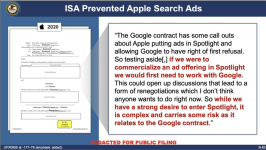Not a super-expert here, but basically, the court put people under a litigation hold. If documents are destroyed while under a litigation hold, the judge or jury can be allowed to draw adverse inference, i.e. assume that what was destroyed said something bad for the destroying party.
I'm not sure what you mean by "tech", but this is not true in my (FAANG, FAANG-adjacent, other large tech company) experience. Everything is written down. Our primary mode of communication is either chat, post, email, or documents. Anything that matters will have a long-lasting record. Now, that record may be marked "A/C Priv", but we have rules around that so it doesn't get abused (though I've heard Google definitely abuses it). I have seen retention policies some places, which say "we autodelete stuff after 3 years" or something, but any litigation involving that individual, even tangentially will trigger a full litigation hold, and nothing will be deleted for that person until the hold expires.In tech, people often will not discuss certain things in writing -- no emails, no chats, not even leaving voice mails.
Last edited:


